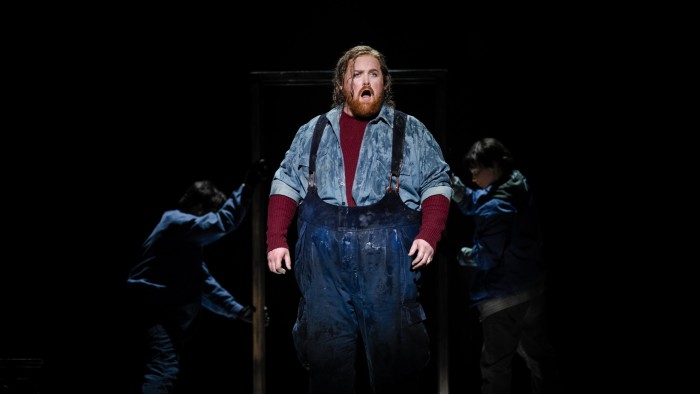Unlock the Editor’s Digest for free
Roula Khalaf, Editor of the FT, selects her favourite stories in this weekly newsletter.
It was heartbreaking to see the Welsh National Opera Chorus and Orchestra wearing “Save our WNO” T-shirts when they came on stage for the curtain calls. In its heyday this company brought kudos and respect to Wales with its international reputation. How did it come to this?
Next year will mark Welsh National Opera’s 80th anniversary, but it is only able to present two new opera productions and two revivals over the 2025-26 season — slim pickings. It is a marvel that the company can still summon the ambition to stage challenging repertoire.
Last year’s dazzlingly inventive production of Britten’s Death in Venice was the highlight of the UK opera season. Now the company is back with Britten and a new production of Peter Grimes, another impressive piece of work even if it falls short of the previous achievement.
Most important, the company’s own resources are key to its success. The WNO Orchestra was on top form and music director Tomáš Hanus increasingly exerted a grip on dramatic tension, the storm interlude reaching hurricane force. With the WNO Chorus giving its all, the musical performance was first-rate.
Melly Still’s production opens with the body of the dead apprentice being dragged across the stage before the music starts. By homing in on the suffering of the child — the dead apprentice reappears later in Grimes’s hut, as the anguished fisherman is haunted by past events — she sets a chilling tone that threads through the performance.
The stage is almost bare throughout, the wind-blown Suffolk coast suggested by little more than a boat hanging from the ceiling. This is decor enough for Britten’s bleak landscape, but Still cannot resist a lot of silly stage business involving chairs, doorframes and windows and throwing in a movement group of four identikit apprentices (it certainly changes the sexual undercurrent of the opera when they are played by young women, not boys). Ditch the movement group and this could be the harrowing production it sets out to be.
In Nicky Spence’s Peter Grimes it has at its centre a portrayal of riveting intensity. The way he brings the text alive is second to none and he has mastered the role’s vocal tests, even if the scene in the fisherman’s hut takes him to the limit, as it does every tenor. Here is a Grimes who genuinely has optimism that a better future might be possible, so when the tragic end comes, it feels even more painful.
Sally Matthews’s Ellen Orford equally tugs strongly at the heart, though her singing is less secure, and David Kempster makes a laid-back Balstrode. The best of the supporting cast are to be found elsewhere, including the class double-act of mezzos Sarah Connolly and Catherine Wyn-Rogers as Auntie and Mrs Sedley, and outstanding cameos from Dominic Sedgwick as a vivid Ned Keene and Callum Thorpe, singing strongly as Hobson.
At the end WNO’s joint general directors and CEOs Sarah Crabtree and Adele Thomas took the stage to call for greater support of the arts. Their speeches were fervent, but this performance had already made the case more powerfully than words could.
★★★★☆
To June 7, wno.org.uk
Read the full article here

